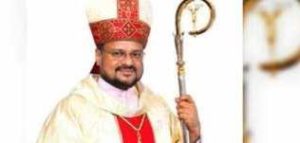The recent development concerning the rape and sexual exploitation charge by a Catholic nun against a bishop, and the way it is playing out has deeply shocked and saddened the Catholics in India and the wider Christian community.
The appropriate thing for the accused bishop would have been to hand in his resignation and go through the trial process.
We are carrying this piece by the Editor of India Currents. It says all that needs to be said.
As the Jalandhar diocese issue takes many twists and turns day by day, my memories take me back to August 1, 1990. Fr Alexander Kadukanmackal of happy memory, walked into our classroom at Jyotiniketan, the Capuchin minor seminary in Ghaziabad, UP and broke a shocking news. On July 13, some men had broken into Saint Mary´s Convent at Gajraula in Uttar Pradesh, 100 kilometers away from New Delhi, assaulted its residents and raped two young nuns.

Fr Alexander instructed us to get ready in a few minutes to go to Delhi to protest against the sexual assault on the nuns. Shocked and pained, all of us, in no time, got into a bus and reached India Gate in the heart of Delhi to take part in a protest against the gruesome act of sexual assault on nuns.
Under the aegis of the CBCI, more than 15,000 people had gathered at the protest site, condemning the rape and demanding justice to the victims. The protesters marched to the then Prime Minister Vishwanath Pratap Singh´s residence, some 3 kilometers away. A delegation representing Christian and women’s groups led by Archbishop Alphonsus Mathias of Bangalore, the then CBCI President, submitted a memorandum to Shri V. P. Singh.
The incident had raised an unprecedented national outcry against what was then known as ‘Gajraula rape’.
Cut to the present.
Twenty eight years down the line, the minor seminarians, who shouted for justice to the traumatized nun and action against the culprits, remain mute spectators to the shrill voice of another devastated nun who is also a ‘rape victim’.
The difference is: In 1990, the culprits were ‘unknown barbarians’. Today, the accused is none else but a bishop. In 1990, we demanded immediate arrest of the culprits to give a semblance of justice to the victims; but today, we are trying to be legally correct stating that an accused is not guilty until proven.
We have made the logic to stand on its head; we have learnt to sing a tune that suits the occasion; we have got the heart to hunt down the victim; we have also learnt the art of running with the hare and hunting with the hounds.
But we have forgotten what Pope Francis said on the issue during his visit to Ireland: “Failure of ecclesiastical authorities to address sexual abuse has rightly given rise to outrage.” Later he added: “The failure to deal with them (sexual abuse by members of the Church) is a source of pain and shame for the Catholic community.” These words seem to have fallen on deaf ears if the Jalandhar issue is any indication.
The whole issue is getting mired in mystery with each passing day; on equal measure it is sullying the image of the church. The police enquiry seems to be going at a snail’s pace. It is in contrast to the express speed they have acted in similar cases, even those involving MLAs and political leaders. Here ‘the accused is not guilty until proven’ principle takes precedence over the victim’s elaborate testimonies before the police.
Moving away from the legal tangle, the Church has to see the issue as a moral and ethical one. By all accounts, there is something ‘terribly wrong’ in Jalandhar diocese. This inference is not based on the complaint of just one nun. A number of my theology professors in Jalandhar, companion priests, nuns and former nuns of the diocese have given vent to the ‘unholy acts’ of the bishop.
The Church authorities cannot close their eyes to this ground reality.
The church hierarchy also should not turn their back on the ‘rarest of the rare’ public protests by priests, nuns and lay people.
Trying to save one person can have disastrous results for the church as a whole. Here again, I am drawing examples from my own batch mates to substantiate a point. I find my batch mates and fellow Capuchins joining the dharna by the nuns and others in Kochi. They do it as they are disgusted at the disastrous developments.
As I too remain dismayed, I appeal to the highest church hierarchy to intervene and set things right before it goes out of hand.
I appeal to Bishop Franco to step aside till he is proved innocent, in a court of law, as he claims vehemently. It is not the time to stand on prestige. It is time to act to keep the holiness of the church intact.
I would like to conclude quoting Pope Francis, which should sound as a warning to the church authorities in India: “With shame and repentance, we acknowledge as an ecclesial community that we were not where we should have been, that we did not act in a timely manner, realizing the magnitude and the gravity of the damage done to so many lives.” Hope the Church in India would show the commitment to act fast on this issue.
Warm regards,
Fr Suresh Mathew OFM Cap
Editor, Indian Currents Weekly,
Delhi


